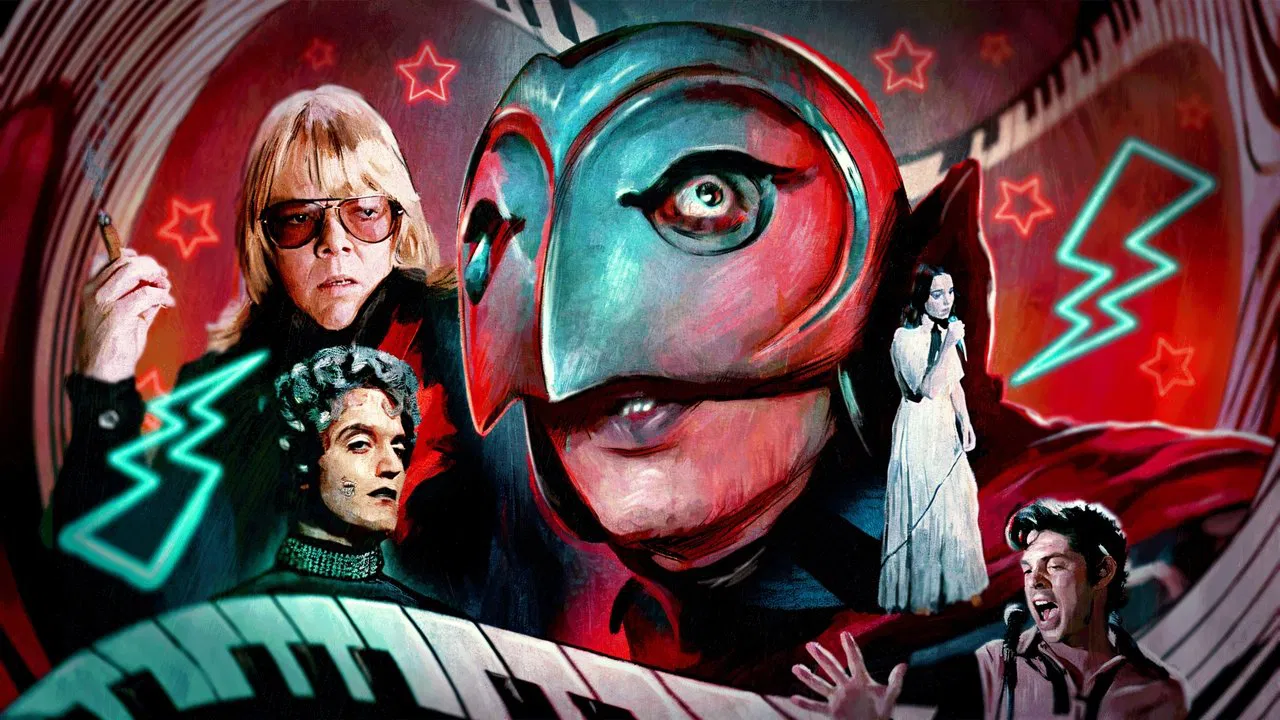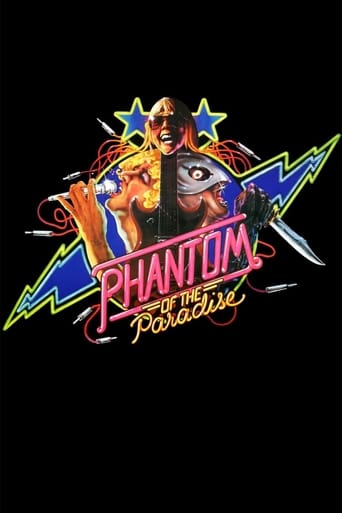

I loved phantom of the paradise.When I was a kid,I watched it first Paul Swan scared me with all his selling his soul to the devil stuff but it is a rock opera the likes of which is not around anymore.Very great film it is up there with Tommy and I miss this era in filmmaking.i want to bring back the Rock opera a la Jesus Christ Superstar.It was sad when he got his head stuck in the record machine,I was also freaked out but the lead character prevails.He was quite the hothead,you know,but people took advantage of him stealing his songs oh but he got even!Great,amazing film loved this!!!!!
... View MoreDear Brian De Palma,you really hate the American music industry, don't you? You didn't even spare The Beach Boys. The songs in the film were truly awful, lol. I guess that was deliberate. Phantom of Paradise is an over the top depiction of American excess, debauchery and bad taste. That and the characters with grotesque faces and garish sets makes Phantom of the Paradise America's Satyricon (the Fellini film) - a study of how uninhabited devotion to pleasure eventually leads to the decline of a civilization. The exaggerated social satire set to music reminded me of A Clockwork Orange. The film might have had an influence on the makers of This is Spinal Tap. William Finley is such a great actor to have in your movie. His odd long face with the big nose, peppered with the cat eyes makes him almost like a special effect. Jessica Harper was disappointing, it was hard to imagine that the talented song writer (Finley) would be so enamored by her. I wonder what you and Dario Argento saw in her. She did act reasonably well though. Paul Williams nailed the creepy and cruel music producer. I noticed some of your trademarks like split screens, long point of view tracking shots and morally repugnant Italians. I was not enamored by the film beyond a certain level. I mean, I like the fact that you are being tongue in cheek with all the over the topness. But there are times when you lost your way with this style (Get to Know Your Rabbit was also an example of this).Best Regards, Pimpin.(5/10)
... View MoreSay "1970s Glam-Rock musical" to anyone and you'll probably get "Rocky Horror Picture Show" in response. However, while "Rocky Horror" is all well and good with its transgender alt-sexuality tunes and uber-campy horror-movie stylings, "Phantom of the Paradise" beats it to the post by a year and furthermore director Brian DePalma (later to direct "Carrie" (1976)) trumps the more famous "Rocky Horror" by impressing with visual style, better tunes (in my opinion), and most of all a plot of substance which marries the Phantom of the Opera to the Faust legend at the same time as functioning as a penetrating critique/satire of the entertainment industry before delivering a genuinely tragic (and need-to-be-seen-to-be-believed) carnival-esque finale.Paul Williams (who also wrote the soundtrack) plays Swan, a media mephisto who through his 'Death' record label and club 'The Paradise' is always on the look-out for the next big thing in order to vamprically feed of it – whether financially or sexually or, presumably preferably, both. As such, he comes across talented but totally unknown song-writer Winslow Leach (William Finley) whose magnum opus, Faust, he promptly steals and who he has sent to prison where he becomes horrendously disfigured in an accident which provides the means of his escape. Thus driven by bitterness and resentment towards Swan, Winslow returns to the Paradise to enact his revenge. However, Swan confronts Winslow and plays on his artistic desire to have his music heard and smooth-talks him into finishing his Faust composition, even conceding to Winslow's provision that only Phoenix (Jessica Harper), an ambitious and talented singer he met once, sings. At this point, Swan tricks Winslow into signing a contract which reveals Swan to be not all he seems.It's hard to recommend that "Rocky Horror" fans should watch this as, despite superficial similarities (mainly in their lush visuals), the movies are chalk and cheese. The difference? Well, first of all it should be said that "Phantom of the Paradise" isn't a strictly-speaking a musical as the songs don't drive the narrative. Instead, the songs are self-contained and included as part of a film about showbiz. Another, more important, difference is that "Rocky Horror", apart from the subversive element of glam-rock gender-bending, is basically just a bit of fluffy fun. In contrast, "Phantom of the Paradise" has grander (and darker) ambitions: the film is a commentary on show-business and show the very real Faustian deals-with-the-Devil people make in their obsession with fame and how people's souls become grotesquely misshapen as a result and I defy anyone to not loathe Swan, be frustrated with Phoenix, and weep for Winslow as this tragic tale unfolds."Rocky Horror" it is not and rightfully so as, although considerably less well-known, "Phantom of the Paradise" is something far, far greater. Watch it.
... View MoreA remake of the Phantom of the Opera in a New York setting, in the days of rock and roll and of show business and of records and rock operas. That must have some kind of filiation or descent from the Rocky Horror Show from London, and it does, but not entirely. I just wonder if it is not also inspired by Anne Rice's Lestat de Lioncourt in his rock star episode of the Queen of the Dead. That sure reveals all the shortcomings and drawbacks of show business and the "mythology" that goes along with it. But it has another dimension that has to do with Brian de Palma too. He had to criticize society and its over-exploitation of artists. But that was easy. So he had to criticize the gullibility of performers of any type, particularly women, and of the audience. They believe anything that comes from the honey sweet mouth of a producer. The audience comes to the show only to experience the impossible or the improbable, and they applaud to the death of a person because that's too much, I mean it is real, really real, perfect, etc. They yell and clap when someone gets cut up and sliced on the stage because that smells like blood and blood is good on a stage, any stage, provided it is fresh and hot and they can get splashed with it. The audience also come because in a show like that they can do what they couldn't do on the sidewalk outside the theater and there Brian de Palma remains very suggestive but no more than suggestive. But what makes that film in a way superb is the fact that Brian de Palma uses his camera and his special effects so well that we really don't have to suspend our disbelief when something odd is happening; it is just normal in the odd situation we have been soaked in for a while. There is no innuendo or half measures or maybe some interrogations about the fact the main singer is gay like in the Rocky Horror Show. He is so gay that he edges onto the caricature without really slipping on the other side. And the language within the producing team about it is just homophobic enough to be believable, but not too much though, just what we can hear on a sound stage or in the wings of a theater in such a situation, though certainly no diplomacy about it, absolutely none. Just plain and simple homophobically gross. So it can end in a total slaughter of everyone available on the last night with knives, daggers, electricity, weapons, machine guns, you name it you have it. And it looks so nice, all those dead bodies floating in blood galore. Apart from that decadent artistic perfection, the film is nothing but a remake of two or three films and nothing else. The electric guitars are not noisier that a couple of cimbaloms.Dr Jacques COULARDEAU, University Paris 1 Pantheon Sorbonne, University Paris 8 Saint Denis, University Paris 12 Créteil, CEGID
... View More